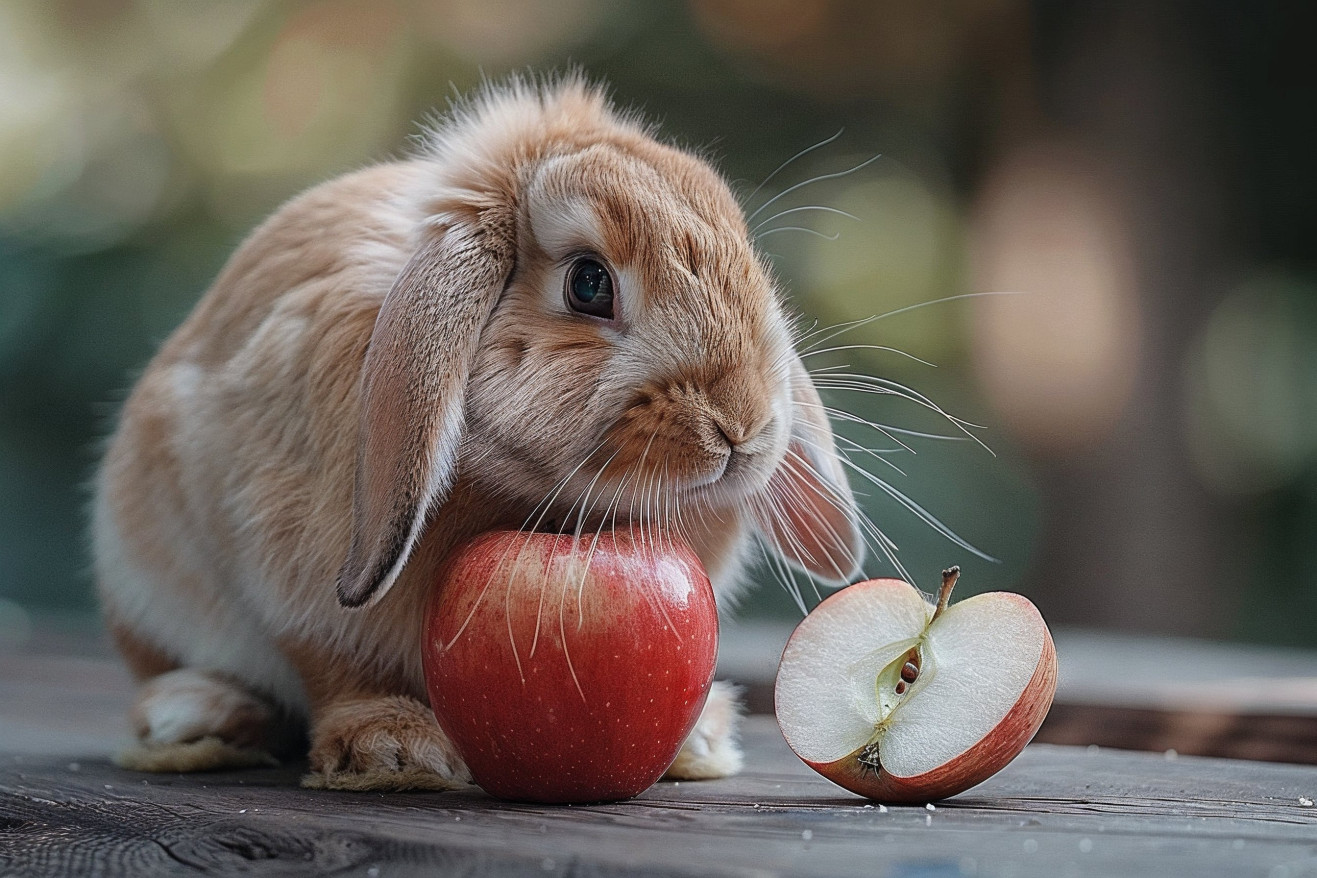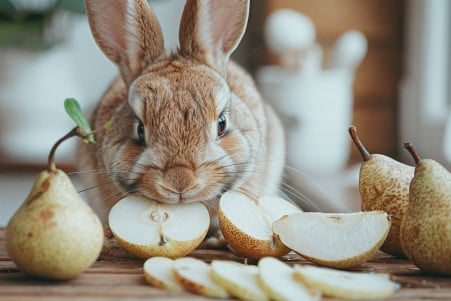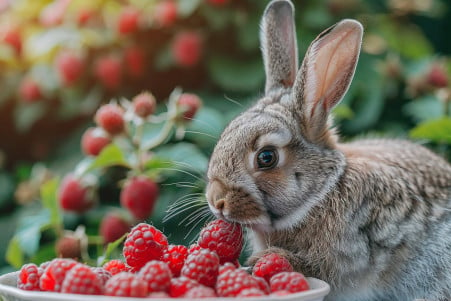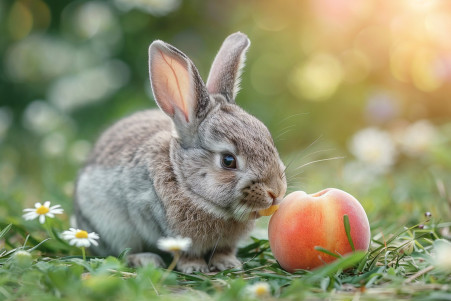Can Rabbits Eat Apples? A Look at the Risks and Benefits
30 March 2024 • Updated 30 March 2024

Can rabbits eat apples, or is this fruit best left out of their diet? Apples can be a nutritious, low-calorie snack for rabbits, as long as they're fed in moderation - no more than 1-2 slices per 5 lbs of body weight per day. However, because of their high sugar content, apples should only be fed in addition to a diet that includes unlimited hay, leafy greens, and a small number of pellets.
This article takes a deep dive into the nutritional content of apples for rabbits, drawing on insights from veterinarians and scientific research. You'll also learn how much apple rabbits of different sizes can eat, the dangers of feeding rabbits too much apple, and how to introduce apple to your rabbit's diet in a way that's safe. Armed with this information, you can determine whether an occasional slice of apple is an appropriate treat for your pet.
Can rabbits eat apples?
Best Serving Sizes and Frequency for Feeding Apples to Rabbits
According to Central Victoria Hay, the best serving size for apples is 1-2 slices per 5 lbs of body weight, and this should only be done once or twice a week. Meanwhile, Rabbits.Life notes that baby rabbits that are younger than 12 weeks old should not eat apples at all because their digestive systems are still developing and can't handle the high sugar content.
Serving sizes should be adjusted based on a rabbit's age, weight, and other dietary factors to ensure that they don't eat too much and experience health problems as a result. Petco suggests that adult rabbits should be fed no more than 2 tablespoons of fruit, including apples, twice a week. When you first start feeding your rabbit apples, you should only give them a small slice or two to see how they react to it and to make sure that it doesn't cause any digestive issues.
It's important to be consistent with serving sizes and frequency to ensure that your rabbit's diet stays balanced and healthy. This is especially important when it comes to apples because sudden changes in the amount of apples that a rabbit eats can cause digestive issues.
By making sure that you only feed your rabbit small, consistent amounts of apples, you can make sure that you're giving them this treat without compromising their overall health and nutrition. This naturally leads to the next topic of making sure that you're aware of the risks of feeding your rabbit too many apples.
Potential Dangers and Digestive Issues Caused by Overfeeding Apples
Feeding your rabbit too many apples can cause a variety of digestive issues, including diarrhea, bloating, and gastrointestinal (GI) stasis, which can be fatal, according to Vets-Now. Symptoms of digestive issues include loss of appetite, depression, teeth grinding, changes in fecal size, shape, or consistency, and a lack of fecal production, according to VCA Animal Hospitals.
The high sugar content in apples can lead to an imbalance in the rabbit's gut flora, which can cause an overgrowth of bad bacteria, according to Bunny Lady. Additionally, rabbits have sensitive digestive systems, and a sudden change in diet or the introduction of too much fruit can cause digestive issues. It's important to note that if any signs of digestive issues are present, veterinary care should be sought out immediately, as waiting to treat the issue can be fatal.
To avoid digestive issues and maintain a healthy gut, it's important to feed your rabbit apples in moderation and to make sure you prepare and introduce new foods properly. The next section will discuss how to feed your rabbit apples safely so that they can enjoy this occasional treat.
How to Safely Prepare and Feed Apples to Rabbits
As per Central Victoria Hay, it is important to make sure that the seeds, stem, and core are removed from apples before giving them to rabbits, as these parts can be poisonous. PDSA also suggests washing apples well to ensure that any pesticide residue or other chemicals are removed.
When adding new items to a rabbit's diet, like apples, Rabbits.Life says that it's important to do so slowly and in small amounts so that you can watch for any negative side effects. It's also important to make sure that apples are always given raw, as cooked or processed apples can be high in sugar and starch, which can cause digestive problems.
To ensure that your rabbit has a healthy gut, make sure that you are giving them plenty of water and hay and that you are feeding them a well-rounded diet, according to Central Victoria Hay. With the right precautions and safe feeding methods, rabbits can eat apples as an occasional treat in a diet that is full of other healthy foods.
More Healthy Fruits and Vegetables to Feed Rabbits
Leafy greens, like kale, spinach, and romaine lettuce, should be the staple of a rabbit's vegetable diet, according to Petco. Other vegetables that are safe for rabbits to eat include carrots, bell peppers, zucchini, and broccoli, although they should be fed in moderation, according to BeChewy.
Fruits such as strawberries, blueberries, and watermelon can be given to rabbits as treats, but they should be fed in small amounts, according to Rabbit.org. It's also important to rotate the fruits and vegetables you feed your rabbit to ensure they have a well-rounded diet and don't eat too much of any one thing.
Rabbits should not be fed avocado, onions, potatoes, or wild mushrooms, as these can be poisonous to them, according to BeChewy. By making sure you feed your rabbit a variety of safe fruits and vegetables, you can make sure they have a healthy and stimulating diet.
How to Introduce Apples to Your Rabbit's Diet and Make Sure They Get a Balanced Diet
As with any new food, you should take 2-4 weeks to introduce apples to your rabbit to prevent digestive issues, according to Small Pet Select. You should start with a small amount and slowly increase the serving size, making sure to watch for signs of digestive issues or abnormal stool.
Make sure that you are also providing an unlimited amount of fresh hay and water to help your rabbit's digestive system adjust to the new food, says the PDSA. In addition, you can rotate the other greens and vegetables that you give your rabbit to make sure that they don't eat too much of one food, which can help make sure that they are getting a balanced diet, according to the Bunny Lady.
You should also make sure that you are taking your rabbit to the vet regularly to make sure that they don't have any health issues that could impact their diet, according to Vetstreet. With these steps and a slow introduction, you can make sure that you are safely introducing apples and other new foods to your rabbit.
Conclusion: Everything in Moderation and With Care
Apples can be a healthy, occasional treat for rabbits if they are fed in moderation and prepared properly. The RSPCA suggests using a small portion of a rabbit's daily intake of greens, pellets or nuggets for treats and says that carrots and apples can be given as treats in small amounts.
That said, The Spruce Pets warns that fruit should not make up more than two percent of a rabbit's diet, as it can lead to digestive problems. Apples should be given in small, controlled amounts, such as a teaspoon or two per rabbit per day or every other day, as recommended by Pets on Mom.com.
It's important to stick to the recommended portion sizes, watch for signs of digestive problems, and introduce new foods slowly. A well-rounded diet that consists mainly of hay, fresh vegetables, and a small amount of pellets is important for a rabbit's health.
Consulting with a vet and keeping up with the latest information on what foods are safe and healthy for rabbits can help ensure that your pet is happy and well. With the right care and attention, the occasional apple slice can be a tasty and nutritious treat for your rabbit.


